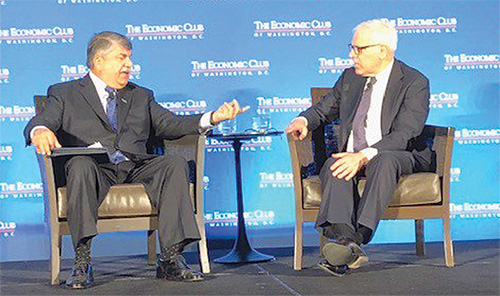By Mark Gruenberg
PAI Staff Writer

Washington (PAI) — The new Democratic-run U.S. House “has stood on the side of workers” on issues ranging from defending federal workers to opposing job-losing “free trade” pacts to pro-worker labor law reform, AFL-CIO President Richard Trumka says.
In a wide-ranging Q-&-A hosted by the Economic Club of Washington, Trumka said the only current exception is the “Green New Deal,” and that’s “because we weren’t part of the process” or at the table when its backers drafted it, he said.But the Democrats’ other big ideas, including wide-ranging electoral reform and Medicare For All – which Trumka predicted would come incrementally, starting with lowering the Medicare eligibility age from 65 to 50 – get Labor’s support, he said.
Trumka gave his evaluation of those issues, and many others, in the hour-plus discussion on April 23 with the club’s president, and a follow up short session with reporters.
His evaluation comes as Congress considers many worker-oriented issues. Among them: Trade pacts, raising the minimum wage to $15 an hour – “and a union” Trumka emphasized – and rewriting Labor law to make it easier for workers to organize and defend themselves. Trumka predicted states’ minimum wage hikes will push Congress to yield on that raise.
NAFTA 2.0
One big issue was workers’ rights, or lack of them, in Mexico, where President Donald Trump has negotiated NAFTA 2.0, formally called the U.S.-Mexico-Canada Agreement (USMCA), a new “free trade” pact.
Trumka reiterated unions’ and workers’ opposition to the USMCA as it now stands, but said he’s had frequent meetings with Trump’s U.S. Trade Representative, Robert Lighthizer, over provisions of the legislation to implement it – and particularly over requiring Mexico to pass new stronger Labor laws, set up mechanisms to enforce them and get rid of an estimated 700,000 low-wage contracts, all negotiated by company unions.
All that is supposed to occur within four years of the USMCA ratification and Trumka doubts it will. That’s one big reason Mexican wages will stay low and be a magnet for U.S. multinationals to continue to export jobs there – and one big reason the AFL-CIO opposes the USMCA as written now.
Trumka and Lighthizer have also met, less frequently, about the U.S.-China trade pact Trump has discussed. That pact is nowhere near completion. Trumka told the reporters it must include strong provisions against Chinese currency manipulation, among other restrictions.
OTHER LABOR ISSUES
Trumka talked of other topics besides trade. They included:
- Collective action and collective bargaining – One problem Labor faces, he added, is how to take the new energy nationwide of mass worker-led movements for “collective action” – everything from the Fight for 15 to Google workers walking out over sexual harassment on the job to teachers being forced to strike, and winning – and translate it into a movement for collective bargaining. He did not elaborate on how unions are wrestling with that question.
- ‘Right-to-work’ laws – Trumka predicted workers would repeal RTW in Wisconsin, where virulently former anti-worker Gov. Scott Walker (R) pushed it through over mass public opposition. That included 100,000 people jamming the streets of Madison in subzero cold and snow. Trumka cited Missourians’ 2-to-1 referendum repeal of RTW there after the GOP-run legislature passed it.
“They realized this is not a time to weaken unions,” due to income stagnation and inequality, he said. Trumka also criticized GOP passage of RTW in Michigan “at 2 or 3 a.m.,” but made no predictions about repeal there. He gave a backhanded compliment to the originator of the RTW slogan, which really, Trumka noted, lets non-members use union services without paying for them. - The need for unions – Trumka returned to a frequent theme: That workers are embittered – and willing to turn away from democracy to demagoguery – by decades of flat and declining incomes while their productivity increased and gains from it went to the 1%.
Trumka again cited Harvard’s survey of millennials showing 70 percent trusted neither democracy nor capitalism. Those millennials, he added, come out with piles of debt, and after seeing their parents lose jobs, homes and pensions to the Wall Street-caused Great Recession.
“There was a link between productivity and compensation. That went on until Ronald Reagan busted the Air Traffic Controllers” in 1981. That sent a signal to corporations nationwide “that it’s OK to bust unions,” he added. - Card check, or voluntary recognition – Trumka touted it again, even though it’s not in the current version of Labor law reform the AFL-CIO and the House Democrats crafted so far. Card check stands for automatic recognition of the union as the workers’ representative when the union gets a verified majority of signed election authorization cards at a workplace. It’s been National Labor Relations Board policy since 1962, but it’s not part of Labor law.


